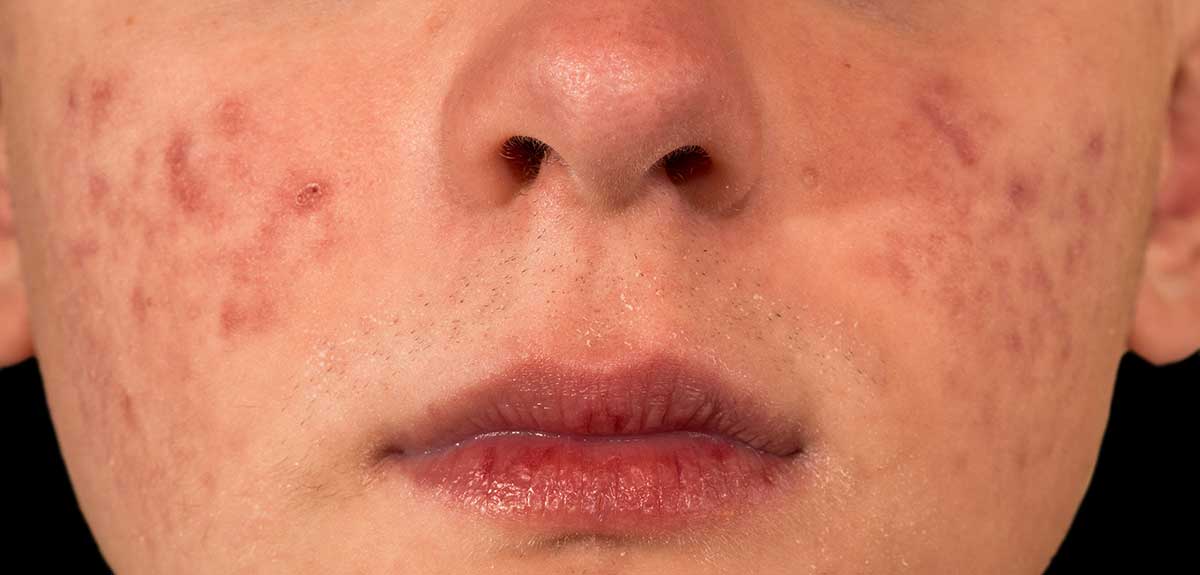Acne is a terrible skin problem to deal with at any age, but sometimes after the acne is gone it leaves a scar in its place making you feel equally distressed. Your skin is the first thing most people notice upon initial encounter. We all want to look and feel our best at all times, but sometime our insecurities about our appearance can hinder such desires. MD Beauty Secrets is here to help and answer all your questions.
How Acne Scars Occur
Acne scars occur mostly because an inflamed blemish injures the healthy skin tissue in the dermis. The skin is made up of two layers, the epidermis and the dermis. The epidermis is the layer closest to the outside world while the dermis is the deeper layer. Depending on where the inflamed lesion takes place, whether it is the epidermis or dermis, will determine if the scar is superficial or deep. Superficial scarring is usually minor and heals quickly.
Inflamed blemishes surface when hair follicles, or pores, are engorged with excess oil, dead skin cells and bacteria (medically termed Propionibacterium acnes). The excess oil, medically referred to as sebum, is produced by the sebaceous glands, which are connected to hair follicles.
When the dermis is damaged the body will automatically react to the skin injury by producing new collagen fibers. Collagen is the fibrous protein that allows our skin to be resilient and elastic. Sadly, although our skin is trying to help us out by producing new collagen fibers to repair itself, the end product isn’t as smooth and flawless as before the damage to the dermis took place.
There are different types of scarring. When the skin produces too much collagen it will create a mass of raised tissue on the skin’s surface called keloids, or hypertrophic scarring. Atrophic scars are the deep scars that leave dents on your skin’s surface. This is due to a loss of tissue. These types of scars are commonly described as ice pick-shaped and boxcar-shaped scars.
People with deeper skin tones will notice darkening (or hyperpigmentation) within the scars, contrary to lighter skin tones that show redness within the scars. In some cases, this discoloration is temporary and may eventually fade on its own. However, peeling agents such as Retinol will speed up the healing process and fading time.
Exposure to harmful UV radiation (e.g. sunbathing and tanning beds) as well as picking and popping your pimples can worsen acne scars. Exposure to UV radiation will produce further discoloration, darkening, and will slow down the healing process substantially. Picking will cause further inflammation and injury of the skin. This will add to the skin’s discoloration and scarring. Trying to pop a pimple will allow pus and bacteria to seep deeper into the skin, ensuing more collagen damage.
Treating Acne Scars
Less severe acne scars can be treated with topical skin treatments, mainly peeling agents such as Retinol and/or Glycolic and Salicylic Acids, which are excellent and effective treatments. For pigmented acne scars, a lightening agent must be used to balance the skin tone. Kojic Acid and Hydroquinone are the most effective ingredients in treating hyperpigmentation caused by acne. Microdermabrasion will also be an excellent option for faster and better results.
Atrophic scars require intense treatments that will repair your skin on a deeper level. Good news is there are many methods of treating atrophic scars. A common treatment is referred to as collagen molding, which simulate collagen through heat, i.e. light, radiofrequency, and ultrasound. Laser Resurfacing is another example, as it uses fractionated laser technology to flatten the skin surface and increase new collagen formation to help fill in the deep acne scars. Other treatments are as follows: Non-Ablative Laser Treatments, Dermabrasion, Microdermabrasion (Diamond Tip), Injections and Chemical Peels.
Preventing Acne Scars
Start an acne-geared skin care regimen that will work for your skin type. Benzoyl Peroxide, Salicylic Acid and Retinol have been proven to be effective ingredients to prevent and control acne. Remember to always use an oil-free sunscreen that contains zinc oxide and that has a SPF potency of 30 or higher.

